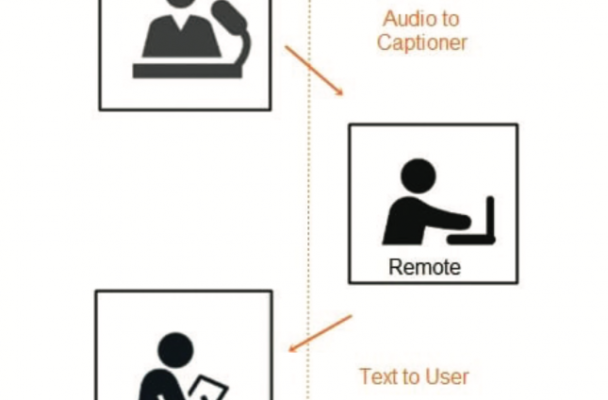The ghost wo sits in the back of the class

By Liv Huang// Staff Writer
Anyone who has ever had a professor that speaks at a quick pace can understand the struggle of trying to remember everything that was said during class, but it is especially difficult for those with hearing problems.
There is an undisclosed number of students who are hearing impaired and require specific accommodations for their academic courses. Enter the Captionist.
The Captionist is a job position that the Office of Accessibility Resources and Services employs for students with a documented diagnosis regarding hearing impairments. They are sometimes students or contracted adults, but they are always silent and hardly ever noticed.
“They can’t interact with the student or professor, they can’t answer questions either. You pretty much don’t make a sound.” Dana Bright, director of the OARS, stresses the importance of confidentiality when students request the help of a Captionist.
“You’re essentially the ears for the student,” Bright says. “It’s like closed captioning on a laptop. Since it’s on Google Doc, they can communicate almost like instant messaging as the lesson goes on.” The Captionist’s main job is to type out every word that the professor says.
In the current Fall 2018 semester, OARS has struggled to find student workers to fill this position and has resorted to hiring two contracted workers to fill the position. One of the workers is Marcia Primus, a High Point local and mother of four. With all four of her kids in school, she is only available in the mornings to work. She logs in an average of 20 hours a week.
Primus carries her laptop, the only tool needed for her job, in a tote bag. She has a long brown hair tied back in a ponytail and wears a rectangular set of reading glasses. If you scan a room quickly, you would hardly notice that she’s out of place amongst a crowd of college students.
“All I do is share the Google doc and set up in the back,” Primus says, “I’m just a ghost in the room.” As boring as her daily routine sounds, Primus quite enjoys being a Captionist.
“I feel like I’m in college again,” Primus says with a chuckle, “I get the best of both worlds, I get to go to class, but I don’t have to write any papers or exams or anything.”
“I’ve been typing for this one gentleman for two semesters now. You start seeing some familiar faces,” even though Bright was very clear that all employees, student or not, must sign a confidentiality agreement. Primus thinks most of the students in the classes she types for knows why she’s there.
When asked about the attention she receives as a grown woman several years older than the students, Primus had nothing negative to report.
“I’ve just really noticed the maturity of the students on campus, there are stigmas and stereotypes attached to the school,” Primus said cautiously, “but I was so pleasantly surprised just how welcoming the young students are.”
“I’m in my pharmacy class and just trying to spell out the names for these medications and I’m just trying to sound it out. I’m like how is she ever going to decipher through it, ” Primus said when asked which classes are the most difficult for them to caption. Her colleagues agree that science classes are more painful to get through.
“I had a philosophy class and he would go on a rant,” said Primus when recalling a particularly interesting professor. She starts laughing before she can even get the words out, “I’m in the middle of typing out this whole personal story before I just stop and realize none of what he’s saying is relevant to the lesson.”
Both Primus and Bright would like to urge anyone who is fluent in another language to consider applying for the Captionist position because for the average Captionist, attending a foreign language class can be “very painful for both the student and the typist” according to Bright.
The OARS offices are tucked away in a corner on the fourth floor of Smith Library, Dana Bright’s warm smile and soothing voice are there to welcome anyone wanting to be a Captionist or in need of one. Her only requirement is having a typing speed of 75 words per minute.
An infographic of the captioning process
Photo by vcinterpreting.com